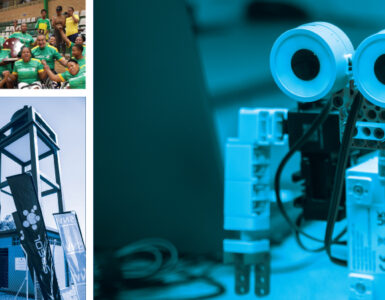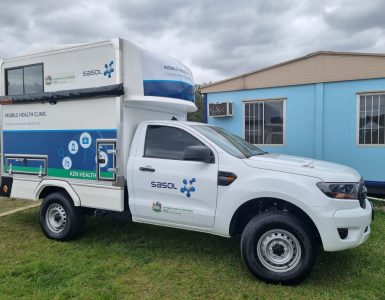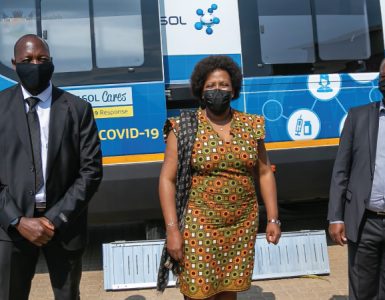Nelson Mandela University partners with Sasol in the production of hand sanitiser for community beneficiaries.
Nelson Mandela University has entered into a partnership with Sasol, which will see the institution’s Institute for Chemical Technology and Downstream Chemicals Technology Station, InnoVenton, with the support of the Technology Innovation Agency (TIA), boost production and provision of free hand sanitisers to communities in need across the Eastern Cape.
The University, which has been producing alcohol-based hand sanitisers for internal use and donating any excess to communities in need, uses its internal production capacity at InnoVenton to process Sasol Ethanol and produce between 400 and 500 liters of hand sanitiser per day. This is distributed to communities in the Eastern Cape, jointly identified with Sasol. The Community Convergence Workstream (CCW) play a key role in working with Community Organisations to ensure that the sanitiser reaches those who need it the most. This team is guided by the need to be responsive to challenges faced by communities as a result of COVID-19, while simultaneously exploring the broader strategic objective of the transformed, engaged, and responsive university played. Production through this partnership will continue until 30 September 2020 or until the envisaged 20 000 litres of hand sanitiser have been produced and distributed.
STRATEGIC PARTNERSHIPS
The strategic partnership with Sasol is one of numerous that have been established to further increase the reach of its hand sanitisers to benefit communities, NGOs NPOs, CBOs hospitals and schools, to minimise the spread of COVID-19 infections and improve the health and safety of communities.
At the outbreak of the COVID-19 pandemic, both Sasol and Mandela University produced hand sanitiser to meet their internal needs, as well as to assist their immediate communities in efforts towards the broader societal fight against COVID-19. At Mandela University, these efforts were carried out through the COVID-19 Coordinating Committee (CCC) that drives the institution’s external response to the pandemic.
Sasol responded to the needs of its own employees, contractors and fence-line communities by developing and producing its own blend of hand sanitiser. The non-medical grade hand sanitiser is based on World Health Organisation (WHO) formulation requirements. To date, Sasol has produced and distributed over 762 000 litres of hand sanitiser for internal use including providing hand sanitiser to various communities in South Africa and Mozambique, all provided free of charge.
Nelson Mandela University responded by producing ~13 000L of hand sanitiser at InnoVenton for use by staff and students, with excess donated to communities in need communities. InnoVenton also provides a hand sanitiser testing service and has shared hand sanitiser production information with small to medium enterprises (SMEs).
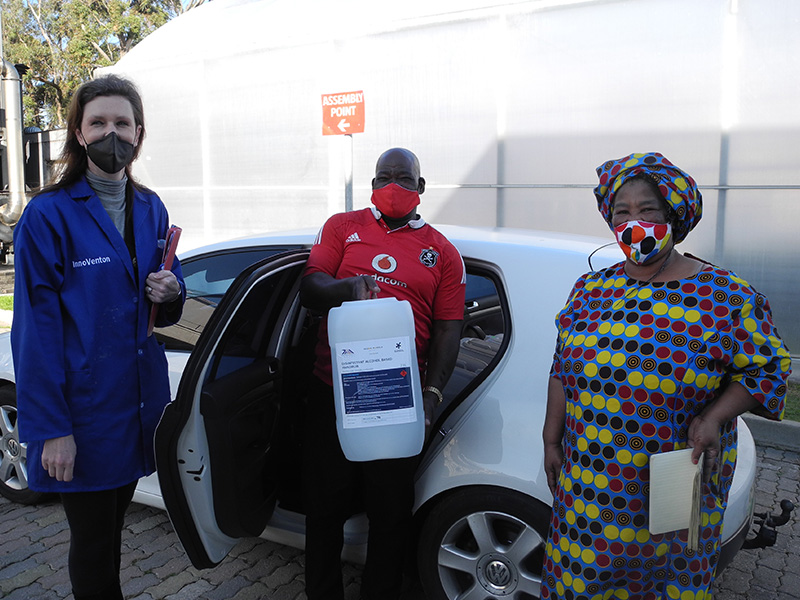
In September 2020, over 550 000 litres of the total produced volumes were donated by Sasol to communities or to beneficiaries through its strategic partnerships. According to Thabiet Booley, Senior Vice President of Sasol’s Base Chemicals business, the Eastern Cape region has been particularly hard hit by the COVID-19 pandemic.
“While the number of critically ill patients have decreased, the Eastern Cape Government has indicated that they are bracing for a surge of infections which was predicted to occur between August and September. We are delighted with the partnership established with Nelson Mandela University as it comes at a time when communities are in urgent need of hand disinfection hygiene support to reduce the risk of COVID-19 infection and to reduce the surge of anticipated infections”.
Executive Dean of the Faculty of Science, Prof Azwinndini Muronga, who leads the hand sanitiser work stream of the COVID-19 Coordinating Committee, said the partnership bode well with the University’s efforts towards curbing the spread of the virus.
“Our efforts in the fight against COVID-19 cannot cease. Given the ongoing need for such preventative measures, we are excited to partner with Sasol to not only boost our sanitiser production, but also be able to dispatch it to those communities that need it most. This is true to our resolve to collaborate with other stakeholders in making a meaningful contribution to the communities in which we are based,” he said.
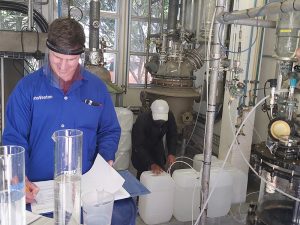
The University has commenced with production and first product is expected to reach communities from the 4th of September 2020. Sasol and Mandela University acknowledges with gratitude the transportation of chemicals to Nelson Mandela University from Sasol by Zosi Group and PeterPan Ubuntu.
Discover other initiatives and partnerships helping our Sasol teams support our communities here.



